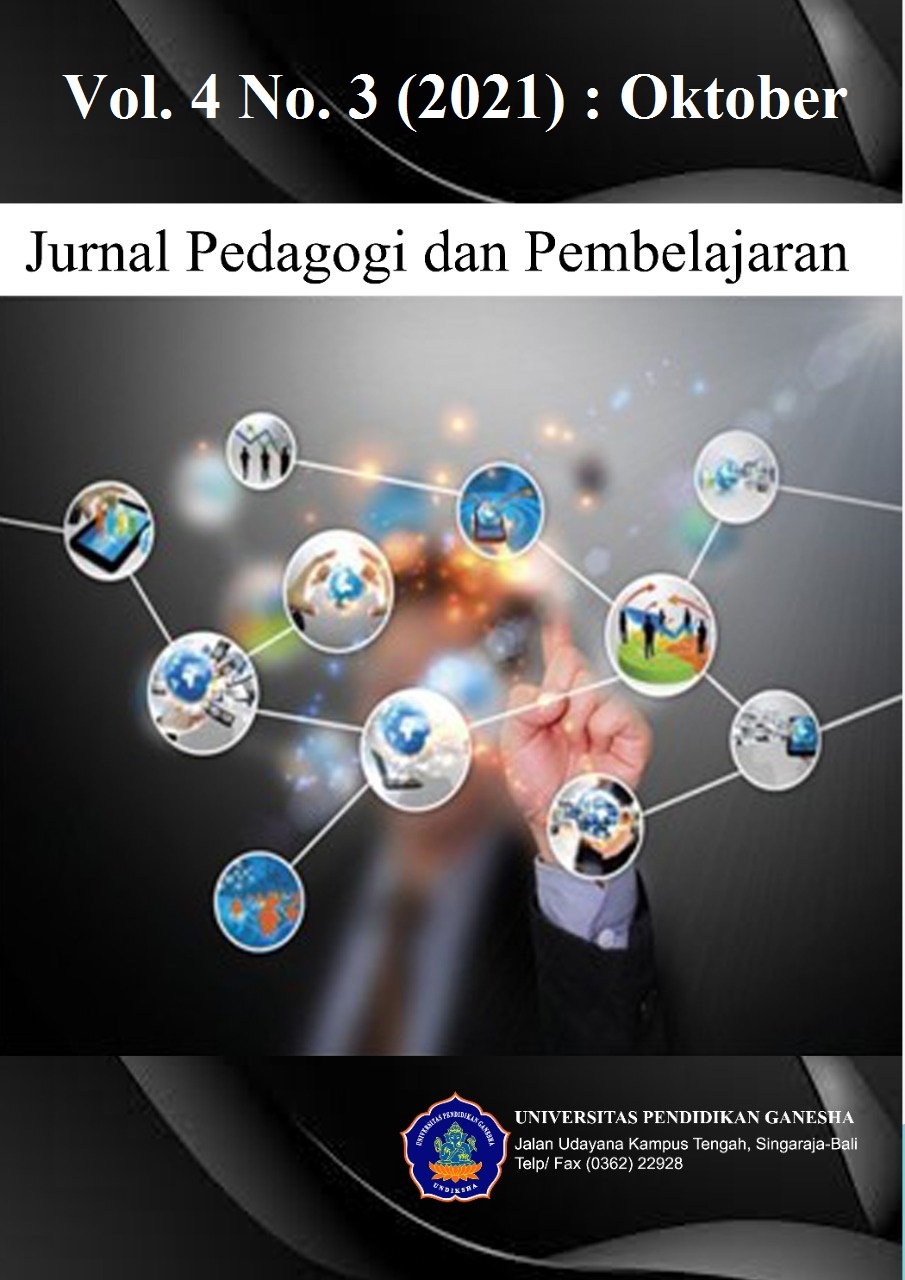Pembelajaran Daring Berbantuan Paired Storytelling terhadap Hasil Belajar Pengembangan Pembelajaran PKn Mahasiswa PGSD
DOI:
https://doi.org/10.23887/jp2.v4i3.40052Keywords:
daring, paired storytelling, hasil belajarAbstract
Pembelajaran daring juga mempunyai keterbatasan karena metode yang digunakan bersifat monoton sehingga berdanpak terhadap hasil belajar siswa serta berdampak terhadap rendahnya kempuan social mahasiswa. Tujuan penelitian ini adalah mengetahui efektifitas pembelajaran daring berbantuan Paired Storytelling terhadap hasil belajar mahasiswa PGSD. Jenis penelitian yang dilakukan adalah penelitian semu. Rancangan penelitian ini menggunakan rancangan posttest only control group design. Populasi penelitian ini adalah seluruh mahasiswa semester VI PGSD yang ada di Singaraja yang berjumlah 176. Data diperoleh dari hasil perhitungan skor tes hasil belajar mahasiswa. Penelitian ini menggunakan dua teknik analisis yaitu analisis deskriptif dan analisis inferensial.Hasil analisis dengan uji t diperoleh terdapat perbedaan antara mahasiswa yang belajar secara daring berbatuan paired Storytelling dengan mahasiswa yang belajar secara daring. Hal ini dapat dilihat dari nilai sig. yang lebih kecil dari 0,05 yaitu 0,00. Terdapat perbedaan antara mahasiswa yang belajar secara daring berbatuan paired Storytelling dengan mahasiswa yang belajar secara daring.References
Andel, S. A., de Vreede, T., Spector, P. E., Padmanabhan, B., Singh, V. K., & Vreede, G. J. de. (2020). Do social features help in video-centric online learning platforms? A social presence perspective. Computers in Human Behavior, 113(April), 106505. https://doi.org/10.1016/j.chb.2020.106505
Anugrahana, A. (2020). Hambatan , Solusi dan Harapan : Pembelajaran Daring Selama Masa Pandemi Covid-19 Oleh Guru Sekolah Dasar. Scholaria: Jurnal Pendidikan Dan Kebudayaan, 10(3), 282–289. https://ejournal.uksw.edu/scholaria/article/view/4033
Arikunto, S. (2015). Dasar-Dasar Evaluasi Pendidikan. Bumi Aksara.
Ayuni, R. D., & Rusmawati, D. (2013). Pengaruh Storytelling Terhadap Perilaku Empati Anak. Jurnal Psikologi Undip, 12(2), 121-130–130. https://doi.org/10.14710/jpu.12.2.121-130
Azis, I. N., & Christin, M. (2019). Efektivitas Teknik Pembelajaran Paired Storytelling Terhadap Keterampilan Menyimak Cerita. Jurnal Politikom Indonesia, 4(2), 182–199. https://doi.org/10.35706/jpi.v4i2.3242
Chang, T. Y., Hong, G., Paganelli, C., Phantumvanit, P., Chang, W. J., Shieh, Y. S., & Hsu, M. L. (2020). Innovation of dental education during COVID-19 pandemic. Journal of Dental Sciences, 155. https://doi.org/10.1016/j.jds.2020.07.011
Dong, C., Cao, S., & Li, H. (2020). Young children’s online learning during COVID-19 pandemic: Chinese parents’ beliefs and attitudes. Children and Youth Services Review, 118(June), 105440. https://doi.org/10.1016/j.childyouth.2020.105440
Elis, D. P., Nuryatin, A., & Wasino. (2017). Keefektivan Penerapan Model Role Playing dan Paired Storytelling terhadap Aktivitas dan Hasil Belajar IPS. Journal of Primary Education, 6(1), 57–64. http://journal.unnes.ac.id/sju/index.php/jpe
Hermawan, Y., Putu, L. M. P., & Renda, N. T. (2016). Penerapan Model Pembelajaran Paired Storytelling Untuk Meningkatkan Keterampilan Berbicara Pada Mata Pelajaran Bahasa Indonesia. E-Journal PGSD Universitas Pendidikan Ganesha., 4(1). https://ejournal.undiksha.ac.id/index.php/JJPGSD/article/view/7641
Hwang, G. J., Wang, S. Y., & Lai, C. L. (2020). Effects of a social regulation-based online learning framework on students’ learning achievements and behaviors in mathematics. Computers and Education, 160, 104031. https://doi.org/10.1016/j.compedu.2020.104031
Lage-Cala, S., Folgueras-Díaza, M. B., Alonso-Hidalgoa, M., García-Menéndezb, D., & Fernández-Garcíab, F. J. (2020). Investigation of the effectiveness of online learning tools for energy performance certificates preparation. Energy Reports, 6, 609–614. https://doi.org/10.1016/j.egyr.2019.09.034
Liu, Q., Huang, J., & Zhou, Z. (2020). Self-expansion via smartphone and smartphone addiction tendency among adolescents: A moderated mediation model. Children and Youth Services Review, 119(June), 105590. https://doi.org/10.1016/j.childyouth.2020.105590
M.Ngalim, P. (2007). Psikologi Pendidikan. Remaja Rosdakarya.
Novianti, C., Sadipun, B., & Balan, J. M. (2020). Pengaruh Motivasi Belajar terhadap Hasil Belajar Matematika Peserta Didik. Science and Phich Education Jurnal, 3(2). https://doi.org/https://doi.org/10.31539/spej.v3i2.992 PENGARUH
Nurming, S. (2017). Efektivitas Model Pembelajaran Tipe Paired Storytelling Dalam Keterampilan Berbicara Bahasa Jerman Siswa Kelas XI SMAN 11 Makassar. Proceeding Of National Seminar, 257–265. https://ojs.unm.ac.id/semnaslemlit/article/view/4015/2374
O’Doherty, D., Dromey, M., Lougheed, J., Hannigan, A., Last, J., & McGrath1, D. (2018). Barriers and solutions to online learning in medical education – an integrative review. BMC Medical Education, 18(130), 1–11. https://doi.org/https://doi.org/10.1186/s12909-018-1240-0
Oktafia, I. H., & Wulandari, S. S. (2020). Pembelajaran Daring Sebagai Upaya Study From Home (SFH) Selama Pandemi Covid 19. Jurnal Pendidikan Administrasi Perkantoran, 8(3). https://doi.org/10.1093/fampra/cmy005
Patricia, A. (2020). College Students’ Use and Acceptance of Emergency Online Learning Due to COVID-19. International Journal of Educational Research Open, 100011. https://doi.org/10.1016/j.ijedro.2020.100011
Rahmawati, M., & Latifah, M. (2020). Penggunaan Gawai, Interaksi Ibu-Anak, Dan Perkembangan Sosial-Emosional Anak Prasekolah. Jur. Ilm. Kel. & Kons., 13(1), 75–86. https://doi.org/DOI: http://dx.doi.org/10.24156/jikk.2020.13.1.75 PENGGUNAAN
Rosdiana, E., Kusmariyatni, N. N., & Widiana, I. W. (2013). Pengaruh Model Pembelajaran Kooperatif Tipe Paired Storytelling Berbantuan Media Audio Visual Terhadap Keterampilan Menyimak Bahasa Indonesia Siswa Kelas V Sd. Keterampilan Menyimak, 08(03), 11. https://doi.org/doi.org/10.23887/jjpgsd.v1i1.826
Samaha, M., & Hawi, N. S. (2016). Computers in Human Behavior Relationships among smartphone addiction , stress , academic performance , and satisfaction with life. Computers in Human Behavior, 57, 321–325. https://doi.org/10.1016/j.chb.2015.12.045
Singh, V., & Thurman, A. (2019). How Many Ways Can We Define Online Learning? A Systematic Literature Review of Definitions of Online Learning (1988-2018). American Journal of Distance Education, 33(4), 289–306. https://doi.org/10.1080/08923647.2019.1663082
Suryani, R., Pranoto, S., & Astuti, B. (2020). The Effectiveness of Storytelling and Roleplaying Media in Enhancing Early Childhood Empathy. Journal of Primary Education, 9(5), 546–553. https://doi.org/https://doi.org/10.15294/jpe.v9i5.43532
Sylvia, R. I. (2019). Analisis Keterampilan Berbicara Berbasis Paired Storytelling (Bercerita Berpasangan) Pada Tema Lingkungan Sahabat Kita Siswa Kelas V Sd Negeri 2 Mojoarum Tahun Ajaran 2018/2019. Jurnal Pena SD, 05, 31–35. https://doi.org/http://dx.doi.org/10.29100/jpsd.v5i1.1534
Yufrinalis, M., Fedia, V., & Gleko, E. (2019). Penggunaan Teknik Paired Story Telling untuk Meningkatkan Keterampilan Berbicara pada Siswa Kelas V SD Katolik HABI. Jurnal Serambi PTK, VI(1), 1–10. http://jurnal.serambimekkah.ac.id/serambi-ptk/article/view/1366
Downloads
Published
How to Cite
Issue
Section
License
Authors who publish with Jurnal Pedagogi dan Pembelajaran agree to the following terms:- Authors retain copyright and grant the journal the right of first publication with the work simultaneously licensed under a Creative Commons Attribution License (CC BY-SA 4.0) that allows others to share the work with an acknowledgment of the work's authorship and initial publication in this journal
- Authors are able to enter into separate, additional contractual arrangements for the non-exclusive distribution of the journal's published version of the work (e.g., post it to an institutional repository or publish it in a book), with an acknowledgment of its initial publication in this journal.
- Authors are permitted and encouraged to post their work online (e.g., in institutional repositories or on their website) prior to and during the submission process, as it can lead to productive exchanges, as well as earlier and greater citation of published work. (See The Effect of Open Access)










